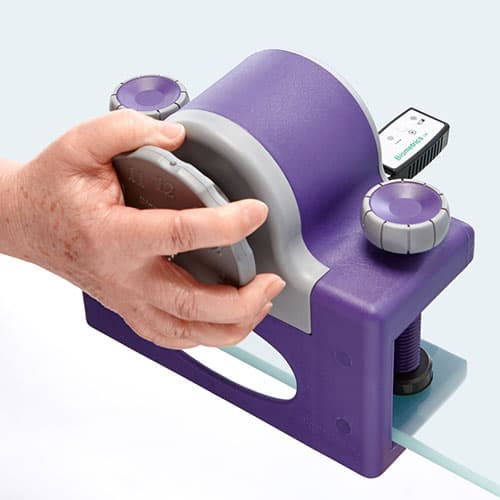£5k donation helps NHS trust to purchase cutting-edge rehab equipment

The Royal Wolverhampton NHS Trust stroke and neurology patients are benefitting from an innovative and motivating rehabilitation device thanks to a generous charity donation of £5,775.90.
Willenhall Area Relief Rehabilitation and Nursing Trust (WARRANT) paid for the E-LINK Upper Limb Exerciser rehabilitation equipment at West Park Hospital.
Now, many stroke patients at the hospital will complete games-based rehabilitation exercises to help improve their motor functions through upper limb exercises and pinch grip attachments.
Patients can access over 30 different games from the Upper Limb Exerciser on a one-to-one basis to enable functional, repetitive movements, and the resistance can be graded for improving the difficulty of the exercise.
Grip attachments help improve grip strengths and games support information processing and spatial awareness.
Jane Bisiker, Clinical Specialist Occupational Therapist for Stroke Services, said: “Thanks to the generosity of an ongoing supporter, both inpatients and outpatients will benefit from this donation, and it will make such a difference to the rehabilitation of our patients.
“There is a range of grips and movements so patients can do a lot of upper limb work on their arms and shoulders. You can grade it from very little resistance then improve it to strengthen your range.
“The patients love it – I have not known anyone who doesn’t enjoy it because it’s fun, engaging and works you really hard without realising it.”
Alongside improving rehabilitation outcomes, the equipment also eases time pressure off rehabilitation staff, as they do not have to spend time preparing exercises. With the upper limb rehabilitation device, staff can click the exercises they want and grade the patients as they complete exercises.
There is also a competitive element for patients if they want it, and they can improve their personal scores each time they use the device.
Additionally, realistic goals can be set and achieved, addressing specific therapeutic objectives. Baseline measurements of a patient’s comfortable range of motion (ROM) can be taken and used for exercise.
Amanda Winwood, Charity Development Manager at the Trust, said: “We’re very grateful for the support WARRANT has provided to purchase these items. The equipment will really help our stroke patients with their rehabilitation.”
The Upper Limb Exerciser is the latest piece of equipment WARRANT has helped with after the charity previously purchased several specially adapted bicycles for stroke patients, costing around £3,500 each.
Reinforcing the clinical benefits of motivating rehabilitation equipment, a study published last year revealed that therapists can safely and effectively use neurorehabilitation technology to implement gamified physical-cognitive task training to help people with Parkinson’s disease to recover.

